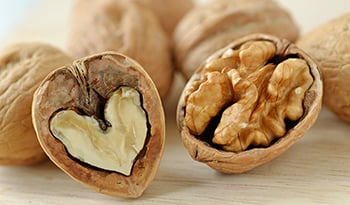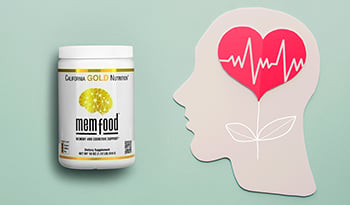8 Nutrients That Support Healthy Aging
DISCLAIMER:This blog does not intend to provide diagnosis...
- In this article:
- Tips for Healthy Aging
- 8 Best Anti-Aging Supplements for a Long, Full Life
- Takeaway

Tips for Healthy Aging
How do you support healthy aging? When we lead a healthy life, age is truly just a number. The trick is to build sustainable daily habits that support head-to-toe wellness. There’s no one-size-fits-all blueprint for healthy aging; your gentle gardening and dog walking may help you “stay golden” during those golden years, while your neighbor may have his marathon training to thank.
In general, though, prioritizing nutrient-rich, whole foods, regular exercise, and quality sleep, and adhering to stress management practices will be important. We're nourishing our cells and encouraging metabolic health by providing our bodies with the daily movement, sleep, and nutrients they need to thrive. This translates into our minds and bodies staying as sharp, strong, and nimble as possible at every age.
In addition to eating balanced meals and staying active, you can incorporate specific nutrients into your supplement rotation to complement your daily habits.
8 Best Anti-Aging Supplements for a Long, Full Life
The following nine supplements and compounds are an excellent way to enhance your healthy aging game for many years to come!
1. R-Lipoic Acid
In the body, lipoic acid is a potent antioxidant that plays an important role in cellular energy production and protects against oxidative stress, which is essentially the wear and tear your body is naturally exposed to over time.
There are two forms of alpha-lipoic acid: “R” and “S.” The “R” form is the biologically active form in the body that gives lipoic acid its antioxidant properties.1 The “S” form is not very active in the body. Choosing dietary supplements that deliver the active form of lipoic acid is a proactive way to reap the cellular energy support benefits of R-lipoic acid.2,3
2. Nicotinamide Riboside (to support NAD+)
There’s a coenzyme in the body called nicotinamide adenine dinucleotide (NAD+ for short) that’s involved in hundreds of metabolic reactions and mitochondrial health (the power packs that produce energy in every cell).4,5 When we experience general fatigue or lack of motivation, it may be due to declining NAD+ levels. That’s because this coenzyme plays a pivotal role in the production of ATP (adenosine triphosphate), your cells’ preferred source of energy.6,7
By supporting healthy levels of the coenzyme NAD+, you can help your body fight general fatigue at the cellular level. In a 2019 randomized controlled trial, adults taking 300 mg of nicotinamide riboside had a 51% increase in blood levels of NAD+ after 2 weeks.7
3. Resveratrol
To age like a fine wine, we must support the health and integrity of our cells. And resveratrol (a compound in red grapes used to make wine) is a healthy aging nutrient.8 Science has found that this polyphenol promotes a wide range of healthy aging benefits, including heart health, healthy insulin sensitivity, and more.9-12 Unfortunately, it’s challenging for the body to absorb traditional resveratrol, but that doesn’t mean you can’t harvest the benefits of this antioxidant. That’s why choosing a high-quality supplement is an excellent way to get the resveratrol benefits you want, no red wine required.
One way to make resveratrol more available to the body is by combining it with galactomannan fibers from fenugreek seeds. This helps make resveratrol up to 10 times more bioavailable than traditional resveratrol.13 You can augment resveratrol’s health benefits with quercetin, a phytonutrient that complements resveratrol. In a randomized clinical study, researchers found that quercetin formulated with fenugreek fibers increased serum quercetin levels up to 62 times higher than traditional quercetin.13 The best part? Quercetin also helps support cardiovascular and endothelial health and helps maintain already healthy blood pressure. It also helps inhibit oxidative stress and promotes a healthy inflammatory response.14-16
4. Fisetin
Fisetin is a smart choice for healthy aging support. It’s an antioxidant found in fruits and vegetables that encourages the natural clearing of senescent cells, the ones that have outlived their usefulness.17 Unfortunately, when we ingest fisetin, it’s metabolized quickly during the digestion process. Combining fisetin with galactomannan fibers from fenugreek seeds can help preserve it through the digestive system, making it up to 25 times more bioavailable than standard fisetin. Fisetin can also support brain health. A clinical trial suggests fisetin may help protect the delicate nerve cells in the brain.18-20
5. Senolytic Compounds
When we think about healthy aging, we focus on maintaining cognitive function, cardiovascular health, and lean muscle mass, which are essential for enjoying every phase of our lives. However, we should also think at a cellular level.
Let’s face it: every function in our body depends on a delicate balance of cell-to-cell communication. All that hard work takes a toll on our cells and results in cellular senescence, a natural part of the aging process where cells no longer function optimally. These senescent cells can accumulate over time and affect the day-to-day function of the healthy cells around them.
The good news is that there are senolytic compounds (like black tea theaflavins and quercetin) that target senescent cells and help the body manage senescent cells.21-23 Apigenin, a natural flavonoid that helps inhibit any remaining senescent cells that quercetin and theaflavins from black tea may leave behind, is critical for healthy aging.24,25
6. Green Tea
Green tea is packed with polyphenols, well-known plant compounds for supporting a healthy lifespan. However, the most well-characterized polyphenol in green tea is EGCG, which has abundant health-promoting properties. Research shows that EGCG supports healthy cellular reproduction, metabolic function, and cardiovascular health.26,27
Unfortunately, getting these benefits isn’t as simple as switching your morning coffee for green matcha. An average cup of tea only contains about 150 mg to 300 mg of polyphenols, so it will take much more than one cup of tea to reap the benefits of green tea’s polyphenols.28 The good news? You can get 725 mg of green tea extract, standardized to 98 percent polyphenols, by choosing a high-quality supplement. You’ll get more of the health-promoting polyphenol EGCG than the equivalent of several cups of green tea, without the caffeine—so you can still enjoy that cup of tea, or coffee, with breakfast.
7. Pycnogenol®
One proprietary nutrient that’s earned a lot of interest recently is Pycnogenol®. This patented French maritime pine bark extract has powerful benefits for healthy aging, cardiovascular, and overall health.29-31 By combining procyanidins, flavonoids, and other beneficial compounds, this nutrient can help the body support a healthy inflammatory response to support whole-body health and helps quench free radical activity that can affect cells, tissues, organs, and even DNA, which can contribute to the aging process.32-36
8. Seaweed
Forget Millennials: did you know there are Centennials? Yes, people who live to be 100 or older. You’ll find them in regions of the world called “Blue Zones.” Among their diverse dietary patterns, people in these regions often include nutrient-rich foods with minimal saturated fats, added sugars, and processed foods. Their daily menus usually include nutrients like fucoidan, a polysaccharide found in edible seaweeds that grow commonly in Japanese and Patagonian waters.37
Of course, venturing out to Pacific waters in search of seaweed sounds like an amazing adventure, but it’s not the most practical way to tap into fucoidan’s benefits. That’s where a high-quality algae supplement can come in.38-41
Takeaway
It’s never too late (or too early) to prioritize our health and well-being. Health is multifaceted, so we need to build a daily routine to help us eat balanced meals, stay active, get quality sleep, and manage our stress. And, of course, by complementing those healthy habits with nutrients and compounds that support you from the inside out, you’re empowering yourself to seize every opportunity to live your life to the fullest.
References:
- Linus Pauling Institute. Accessed February 26, 2024. https://lpi.oregonstate.edu/mic/dietary-factors/lipoic-acid
- Biochemical pharmacology. 1996;51(3):233-238.
- Biofactors. 2003;17(1-4):207-213.
- Int J Mol Sci. 2023;24(3)
- Mol Metab. 2021;49:101195.
- Exp Gerontol. 2020;134:110888.
- Sci Rep. 2019;9(1):9772.
- Med Res Rev. 2019;39(5):1851-1891.
- Micronutrient Information Center. 2015;2018(04/23/2018)
- Biochim Biophys Acta. 2015;1852(6):1145-54.
- Obes Rev. 2016;17(12):1329-1340.
- Phytother Res. 2022
- ACS Omega. 2022
- Crit Rev Food Sci Nutr. 2020;60(11):1855-1868.
- Nutrients. 2020;12(9)
- Pharmacol Res. 2010;62(3):237-42.
- EBioMedicine. 2018;36:18-28.
- Clin Appl Thromb Hemost. 2019;25:1076029619871359.
- Journal of dietary supplements. 2020:1-15.
- Molecular neurobiology. 2017;54(3):2269-2285.
- Exp Gerontol. 2015;68:19-25.
- Free Radic Biol Med. 2017;113:59-70.
- Pharmacol Res. 2012;66(4):363-73.
- Nat Med. 2015;21(12):1424-35.
- Biochem Pharmacol. 2015;96(4):337-48.
- J Cancer Prev. 2015;20(1):1-4.
- Int J Cardiol. 2016;202:967-74.
- Expert Opin Drug Discov. 2011;6(6):589-595.
- Minerva Ginecol. 2017;69(1):29-34.
- Nutr Res. 2008;28(5):315-20.
- Phytother Res. 2019;33(2):276-287.
- DNA Cell Biol. 2016;35(11):730-739.
- Phytother Res. 2014;28(3):348-62.
- Eur Heart J. 2012;33(13):1589-97.
- Hypertens Res. 2007;30(9):775-80.
- Life Sci. 2004;74(7):855-62
- Food Chemistry. 2009;115(2):501-508.
- Antivir Ther. 2011;16(1):89-98.
- J Nutr. 2013;143(11):1794-8.
- Mar Drugs. 2019;17(3)
- Asia Pac J Clin Nutr. 2001;10(2):159-64.
- Mol Nutr Food Res. 2016;60(4):773-86.
- Cancer Prev Res (Phila). 2017;10(2):153-160.
- Front Pharmacol. 2018;9:530.

 By Dr. Michael A. Smith, M.D.
By Dr. Michael A. Smith, M.D.



